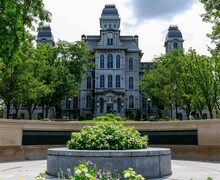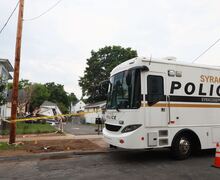Area residents address Walsh finances committee at Le Moyne College meeting
Wasim Ahmad | Staff Photographer
In the 2015-16 fiscal year, Syracuse had an operating deficit of about $3 million, said Ken Mokrzycki on Wednesday. Mokrzycki is a co-chair of Mayor-elect Ben Walsh's finances committee.
Syracuse residents on Wednesday addressed a city committee organized by Mayor-elect Ben Walsh to review major financial issues City Hall could face in the next four years.
Several members of Walsh’s new finances committee attended the forum, including Howie Hawkins, who ran for mayor on the Green Party ticket earlier this year, and Ann Rooney, deputy county executive of human services for Onondaga County and one of the committee’s three co-chairs. The event was held at Le Moyne College. A similar event was held by Walsh’s neighborhoods and public safety committee at the Southwest Community Center Library on Tuesday.
In an opening statement, Ken Mokrzycki, another co-chair of the finances committee, outlined several fiscal challenges that could affect Syracuse during Walsh’s term in office. Mokrzycki is a former deputy mayor of the city.
“There’s good news and bad news …the city has substantial reserves, totaling about $40 million,” Mokrzycki said. “The bad news is that, for the last several years, the city has been spending more than it’s been taking in.”
In the 2015-16 fiscal year, Syracuse had an operating deficit of about $3 million, and the approved budget for the upcoming fiscal year includes a deficit of about $16.5 million, Mokrzycki said. These deficit figures do not include Syracuse City School District finances, he said. The co-chair added that deficit spending has been a consistent problem in the city for years and could result in a depletion of cash reserves.
“At the rate we’re spending, now and into the future, there’s only a couple of years that we know we’ll be on firm financial footing,” Mokrzycki said. A handful of local residents at the meeting expressed concerns about affordable housing and energy efficiency programs.
Walsh has previously said that increasing homeownership and promoting mixed-income housing throughout Syracuse will be goals of his while in office.
Ruthnie Angrand, a Syracuse resident, was forced to move out of her old neighborhood due to consistent rent increases, she said at the meeting. Angrand said the city should work with landlords to create rent-to-own programs to help residents stay in their homes.
“I’ve seen independent landlords and smaller development companies do some innovative things and turn over their units,” Angrand said. “But they’re going to request the highest amount of money for those units.”
Michael Dunbar, a city resident, said better addressing energy efficiency issues could help support Syracuse families.
“Energy efficiency programs for low and modest income households could serve as a real catalyst to the entire economy,” Dunbar said. “It could reduce financial burdens for people who need assistance with their heating and would retain people in their homes.”
Affordable housing is not something the city budget has addressed in the past, and those concerns will be forwarded to other relevant committees, Mokrzycki said.
The committee will send a report to Walsh on how to best address city financing, including Syracuse’s deficit, by Dec. 29. David Van Slyke, dean of Syracuse University’s Maxwell School of Citizenship and Public Affairs, is a member of the finances committee.
Published on December 14, 2017 at 12:10 am




